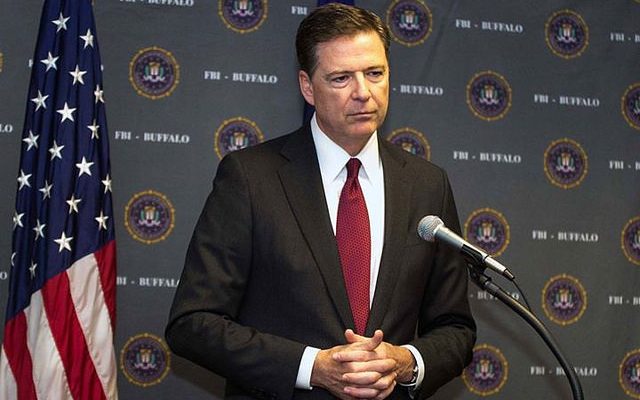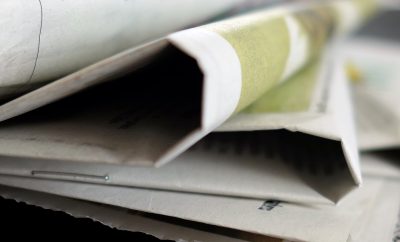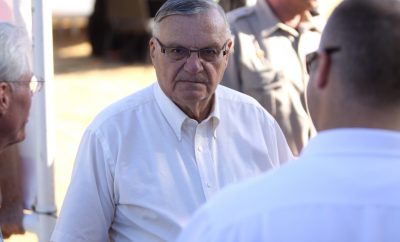 "James Comey" Courtesy of Rich Girard: License (CC BY-SA 2.0)
"James Comey" Courtesy of Rich Girard: License (CC BY-SA 2.0)
Law
Comey Hearing Recap: Defining Obstruction of Justice
While testifying before the Senate on Thursday, Former FBI Director James Comey faced questions seeking to determine whether or not President Donald Trump’s actions amount to obstruction of justice.
The debate first began on Wednesday when Comey’s prepared opening statement was released to the public. The statement recounts conversations with the president in which he pressed for Comey’s loyalty, distanced himself from an unconfirmed dossier, and assured the director that former White House National Security Adviser Michael Flynn was a “good guy” that “has been through a lot.”
But the standout moment came later on in a conversation between Comey and President Trump. Comey noted in his statement:
[Trump] then said, ‘I hope you can see your way clear to letting this go, to letting Flynn go. He is a good guy. I hope you can let this go.’ I replied only that ‘he is a good guy.’ I did not say I would ‘let this go.’
While many speculated on the subject, the Senate Intelligence Committee decided it would be best to ask Comey himself. Chairman Richard Burr (R-NC) was the first to ask if the president obstructed justice, but the former FBI director would not weigh in on the subject, only noting that he found Trump’s comments to be “disturbing.”
“There was an open FBI criminal investigation of his statements in connection with the Russian contacts and the contacts themselves,” Comey said. “And so that was my assessment at the time. I don’t think it’s for me to say whether the conversation I had with the president was an effort to obstruct.”
Senator James Risch (R-ID) expanded on the chairman’s questions and asked whether Trump had explicitly “ordered” or “directed” Comey to drop the Flynn investigation. Comey responded that he understood the president’s statement to be an order, but that Trump had used the words, “I hope.”
The senator continued to probe about the semantics.
“He said, ‘I hope.’ You don’t know of anyone who’s ever been charged [with obstruction of justice] for hoping something. Is that a fair statement?” asked Risch. “I don’t as I sit here,” replied Comey with a shrug.
Sen. James Risch asks Comey about obstruction of justice
Watch live here: https://t.co/THlNhXekzk pic.twitter.com/REs7GfdKNY
— Washington Post (@washingtonpost) June 8, 2017
Senator Risch is a strong supporter of the Trump Administration. He is on the record saying that the president was right, and even entitled, to share classified information with Russian officials in the Oval Office. He also agrees with the president that the ongoing leaks to the news media are a cause for concern. It’s likely that he saw Comey’s responses to his line of questioning as a victory and proof that Trump did not obstruct justice.
However, Senator Risch’s questioning implies that an obstruction of justice charge requires an explicit order from the accused, which may not be the case given the fairly broad federal statutes in place. There are several relevant statutes to this situation, which may implicate anyone who “corruptly […] endeavors to influence, obstruct, or impede the due and proper administration of the law.” So asking Comey to drop part of an investigation, and later firing him, could meet these requirements, particularly when you consider the power dynamic between an FBI director and president.
Samuel Buell, a criminal law professor at Duke University and former federal prosecutor who led the Justice Department’s Enron task force, told the New York Times that the case against Trump has only grown over time.
“The evidence of improper purpose has gotten much stronger since the day of Comey’s firing,” Buell said. “Trump has made admissions about that. And we now have evidence that he may have indicated an improper purpose previously in his communications with Comey about the Russia investigation.”
Of course, Trump did have the legal authority to fire Comey. In fact, the former director even noted in his testimony that he was aware that he could be fired at any moment for any reason at all when he first took the job. But courts have ruled that acts generally considered lawful can be illegal if they are meant to obstruct justice.
Even so, this testimony might not mean much for the immediate future. The process of impeachment is hardly swift and involves both quasi-judicial and quasi-political proceedings. Not only does the president have to have committed “treason, bribery, or other high crimes and misdemeanors,” but a majority in the House and two-thirds of the Senate need to agree in order to impeach and remove a president from office. Also, the events surrounding this testimony, and subsequent accusations, are largely unprecedented, creating more than its fair share of uncertainty.
It should be noted, however, that two most recent American presidents subjected to impeachment proceedings–Bill Clinton in 1998, and Richard Nixon in 1974, although he resigned before the House could vote–were accused of obstruction of justice.








Comments